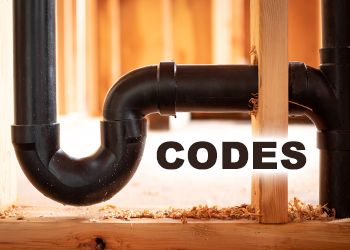 Plumbing codes are the unsung heroes of modern infrastructure, ensuring that our homes, businesses, and communities have safe, efficient, and reliable plumbing systems. While they may seem like a technical aspect of construction and renovation projects, understanding plumbing codes is crucial for anyone involved in the planning, installation, or maintenance of plumbing systems. Here’s an in-depth look at what plumbing codes are and why they matter.
Plumbing codes are the unsung heroes of modern infrastructure, ensuring that our homes, businesses, and communities have safe, efficient, and reliable plumbing systems. While they may seem like a technical aspect of construction and renovation projects, understanding plumbing codes is crucial for anyone involved in the planning, installation, or maintenance of plumbing systems. Here’s an in-depth look at what plumbing codes are and why they matter.
What Are Plumbing Codes?
Plumbing codes are a set of regulations and standards that dictate how plumbing systems should be designed, installed, and maintained. These codes cover a wide range of elements, including:
- Pipe sizes and materials
- Water supply systems
- Drainage and venting
- Fixture installation
- Backflow prevention
- Water heater installation
- Sewage and waste management
Plumbing codes vary by region but are typically based on widely accepted standards such as the Uniform Plumbing Code (UPC) or the International Plumbing Code (IPC).
The Importance of Plumbing Codes
- Ensuring Health and Safety
The primary goal of plumbing codes is to protect public health. Improperly installed plumbing systems can lead to contaminated water supplies, exposure to harmful gases, and unsanitary conditions. Adhering to plumbing codes ensures that drinking water remains clean and wastewater is safely removed.
- Preventing System Failures
A well-designed plumbing system minimizes the risk of leaks, blockages, and other issues that could result in costly repairs or property damage. Plumbing codes provide guidelines for durable materials and proper installation techniques, reducing the likelihood of system failures.
- Promoting Water Conservation
Modern plumbing codes often include provisions for water-efficient fixtures and systems. These measures help conserve water, reduce utility bills, and contribute to environmental sustainability.
- Legal Compliance
Failing to adhere to plumbing codes can result in fines, project delays, or the need for costly rework. In many cases, code compliance is a requirement for obtaining building permits and passing inspections.
- Protecting Property Value
Homes and buildings with plumbing systems installed according to code are more likely to pass inspections, sell faster, and retain their value. Non-compliance, on the other hand, can lead to legal disputes and devaluation.
Who Needs to Know About Plumbing Codes?
While plumbers and contractors are the primary professionals responsible for adhering to plumbing codes, property owners, project managers, and architects should also have a basic understanding of these regulations. Knowing the basics can help you:
- Communicate effectively with contractors
- Avoid costly mistakes
- Ensure your project stays on track
How to Stay Informed
- Hire Licensed Professionals: Always work with licensed plumbers who are familiar with local codes.
- Consult Local Authorities: Your city or county’s building department can provide information on applicable plumbing codes and permit requirements.
- Stay Updated: Plumbing codes are periodically revised to incorporate new technologies and best practices. Stay informed about updates to ensure compliance.
Conclusion
Plumbing codes may not be the most glamorous topic, but they are foundational to the safety, functionality, and efficiency of our plumbing systems. Whether you’re building a new home, renovating a commercial space, or maintaining existing infrastructure, understanding and adhering to plumbing codes is essential. By prioritizing code compliance, you not only safeguard health and property but also contribute to a more sustainable and reliable built environment.
For more information visit MB HAYNES Plumbing at: https://www.mbhaynes.com/haynes-plumbing/#residential
